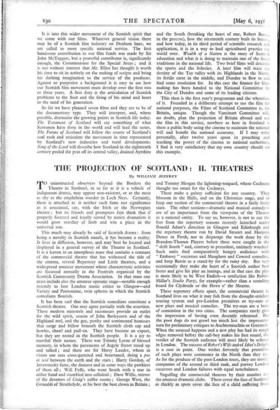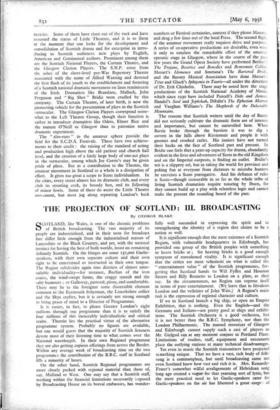TIlE PROJECTION OF SCOTLAND: II. THEATRES
By WILLIAM JEFFREY
TO uninstructed observers beyond the Borders the Theatre in Scotland, in so far as it is a vehicle of indigenous drama, may appear non-existent, or at the most as shy as the amphibian wonder in Loch Ness. Certainly, there is attached to it neither such fame nor significance as is associated, say, with the Irish or the Norwegian theatre ; but its friends and prompters fain think that if properly fostered and loyally served by native dramatists it would grow sturdier of limb and win a place in the universal sun.
This much may already be said of Scottish drama : from being a novelty in Scottish annals, it has become a reality. It lives in diffusion, however, and may best be located and 'displayed in a general survey, of the Theatre in Scotland. It is.a leaven in an amorphous, mass that contains a remnant of the commercial theatre that has withstood the tide of the cinema, several Repertory and Little theatres, and a widespread amateur movement whose characteristic activities are focussed annually in the Festivals organised by the Scottish Community Drama Association. . In that mass one must include also the amateur operatic stage—notable enough recently to lure London music critics to Glasgow—and Variety and Pantomime, twin spheres in which the Scottish comedians flourish.
It has been said that the Scottish comedians constitute a Scottish theatre. One may agree partially with the assertion. These modem minstrels and raconteurs provide an outlet for the wild spirit, cousin of John Barleycorn and of the Highland reel, and the gay, pawky and sentimental humours that surge and billow beneath the Scottish cloth cap and bowler, shawl and pull-on. . They have become an export, but they are rooted in the Scottish people. It is a joy to marshal-their -names. There -was TOmmy -Lorne of blessed memory, in whom the pavements of Argyle Street stood up and talked ; and there are Sir Harry Lauder, whom in vision one sees cross-gartered and betartaned, doing a pas de seul between the earth and the stars ; Harry Gordon, of Inversnecky fame, the dmicest and in some ways the pawkiest of them all ; Will Fyffe, who went South with a tear in either hand and stumbled into celluloid ; Dave Willis, mirror of the devotees of Craig's coffee rooms ; George West, the Grimaldi of Strathclyde, at his best the best clown in Britain.; and Tommy Morgan the lightning-tongued, whom Cochrane thought too smart for the Cockneys.
These make a galaxy sufficient for any country. They blossom in the Halls, and on the Christmas stage, and so keep one section of the commercial theatre in a -fairly lively state. The other sections—dramatic and musical comedy— are of no importance from the viewpoint of the Theatre as a national entity. To say so, however, is not to cut the feet from the repertory seasons recently launched under Ronald Adam's direction in Glasgow and Edinburgh and the repertory theatre run by David Steuart and Marjorie Dence in Perth, nor to disparage the work done by the Brandon-Thomas Players before these were caught in the "drift South" and, contrary to precedent, untimely wrecked. Such units feed comparatively hungry audiences with " Embassy " successes and Maugham and Coward comedies, and keep Barrie as a stand-by for- the rainy day. But very occasionally. they, make the heart of a Scottish author beat faster and give his play an innings, and in that case the play is more likely to be West Endish—a confection like Robins Millar's Studio Party, for example—rather than a sounding board for Clydeside or the Howe o' the Meams.
These repertory efforts apart, the comMdrcial theatre in Scotland lives on what it may fish from the drought-stricken touring system and pre-London premieres or try-outs of new plays and musical comedies. The try-outs ,are a bone of contention in the two cities. The companies rarely give the impression of having even _ decently. rehearsed. But the poor dogs do not growl too ninch-lest- the impresario' turn for preliminary critiques to Auchtermuchtinor Greenock. When the unusual happens and a flew play has had its rough edges removed before the call-boy makes his first round, the verdict of the Scottish audience Will _most likely be echoed in London. The success ofRobert'EW& andof -Idiot's Delight is a case in point. One wishes .fervently that premieres of such plays were commoner in the North than they are. As for the produce of the post-London tours, they are mostly companies of the second or third rank, and imivey London successes and London failures with equal nonchalance.
Engulfing the commercial theatres by. their number are the amateur dramatic dubs. These cover the face of Scotia n‘i is:tbcklyjpota:cover.the.face.at a.. child auffcring fr measles. Some of them have risen out of the ruck and have assumed the status of Little Theatres, and it is to. them at the moment that one looks for the development and consolidation of Scottish drama and for enterprise in intro- ducing to Scottish audiences new plays by English, American and Continental authors. Prominent among them are the Scottish National Players, the Curtain Theatre, and the Glasgow Clarion Players. The S.N.P. arose from the ashes of the short-lived pre-War Repertory Theatre associated with the name of Alfred Wareing and devoted the first flush of its youth to the establishment and fostering of a Scottish national dramatic movement on lines reminiscent of the Irish. Dramatists like - Brandane, Malloch; John Ferguson and "Big Shot" Bridle were cradled by this company. The Curtain Theatre, of later birth, is now the pioneering vehicle for the presentation of plays in the Scottish vernacular. The Glasgow Clarion Players correspond some- what to the Left Theatre Group, though their function is rather to introduce dramatists like Odets, Elmer Rice and the mature O'Neill to • Glasgow than to patronise native dramatic experiment.
, The " also-rans " in the amateur sphere provide the field for the S.C.D.A. Festivals. These have two achieve- ments to their credit : the raising of the standard of acting and production high above the old parlour and church hall level, and the creation of a fairly large body of one-act plays in the vernacular, among which Joe Corrie's may be given pride of place. But as a contribution to the Theatre, the amateur movement in Scotland as a whole is a dissipation of effort. It gives too great a scope to Scots individualism. In the cities, every street almost has its dramatic club, and every club its strutting cock, its broody hen, and its following of minor fowls. Some of these do assist the Little Theatre movement, but most jog along repeating London's back numbers-or Festival certainties, content if they please Manund and drag a few lines Out of the local Press. The-second flight of the amateur movement really requires drive and purpose A series of co-operative productions are desirable, even were it only to emulate the remarkable effort of the amateur operatic stage in Glasgow, where in the course of the past few years the Grand Opera Society have performed Berlioz's The Trojans, Beatrice and Benedict and Benvenuto Cellini, Mozart's Idomeneo and Smetana's The Bartered Bride, and the Barony Musical Association have done Mozart's Titus and Gluck's lphigenia in Tauris—all under the direction of Dr. Erik Chisholm. There may be noted here the stage productions of the Scottish National Academy of Music, which since 1930 have included Purcell's Dido and Aeneas, Handel's Saul and gephthah, Dibdin's The Ephesus's Matron and Vaughan Williams's The Shepherds of the Delectable Mountains.
The reasons that Scottish writers until the day of Barrie did not seriously cultivate the dramatic form are of interest and importance, but cannot be unravelled here. When Barrie broke through the barriers it was to dig a cavern in the bills above Kirriemuir and people it with gnomes and crooked caries. His juniors have not turned their backs on the face of Scotland past and 'present. In Bridle one feels that a pent-up capacity for drama, abundantly evident in the lives and adventures of Scots in the old Kingdom and on the Imperial outposts, is finding an outlet. Bridle's wit is a slippery eel, but in taking the world for province and poking fun at everyone from dictators to microbe hunters he exercises a Scots prerogative. And his defiance of rules is Scots—though censurable in so far as the whole tribe of living Scottish dramatists require tutoring by Ibsen, for they cannot build up a play with relentless logic and cannot make the present the sounding board of the past.



































































 Previous page
Previous page